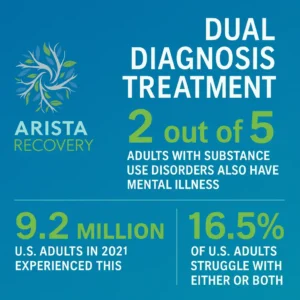When someone you love is both struggling with substance use and sinking under untreated depression, anxiety, trauma—or all three—it doesn’t just break your heart. It puts you in a daily state of survival.
Some days you’re their caretaker. Other days, their emotional punching bag. Sometimes you catch glimpses of who they were before all of this. And sometimes, you wonder if you’re losing yourself just trying to hold them together.
If this sounds like your life, Dual Diagnosis Treatment might be the thing that changes it. Not just for them—but for you, too.
Within the first few days of entering a Dual Diagnosis Treatment program, many clients begin to stabilize in ways they couldn’t before. Because this isn’t about “just getting clean.” It’s about finally treating the whole person—including the parts that hurt the most and hide the deepest.
What is Dual Diagnosis Treatment?
Dual Diagnosis Treatment is designed for people who are living with both substance use issues and a mental health condition, such as:
- Depression
- Anxiety
- Bipolar disorder
- PTSD or complex trauma
- Personality disorders
- Panic attacks or OCD
In many cases, one condition fuels the other. Drinking to numb anxiety. Using pills to sleep. Depression making sobriety feel pointless. Dual Diagnosis Treatment doesn’t treat these conditions in silos. It addresses how they interact, reinforce, and sabotage each other—so real healing can begin.
At Arista Recovery, we offer Dual Diagnosis Treatment that is integrated, trauma-informed, and deeply individualized. That means one team, one plan, one safe place for it all to unfold.
Why Addiction and Mental Health Disorders Often Coexist
Imagine being stuck in a loop: mental pain leads to substance use, and substance use worsens the mental pain. That’s the cycle of co-occurring disorders.
Some people begin with trauma or untreated mental illness and use substances to cope. Others develop mental health symptoms because of long-term substance use and instability. Either way, both issues end up feeding each other—and neither one gets better without treating the other.
It’s not about willpower. It’s chemistry. Brain wiring. Trauma. Pain. And for many, it’s years of feeling dismissed, misdiagnosed, or misunderstood.
“They keep blaming their addiction on depression. Is that real?”
Yes. And it’s also not the whole story.
It’s common for people to point to mental health symptoms—“I’m just depressed,” “It’s my anxiety”—without acknowledging their substance use. Sometimes they’re using those phrases as shields. But often, they genuinely can’t separate the two. And that’s not manipulation—it’s the effect of untreated co-occurring disorders.
A trained Dual Diagnosis team knows how to unpack that without judgment. They don’t dismiss the mental health piece. But they also don’t let addiction hide behind it. Both matter. Both need care. And when addressed together, they stop canceling out each other’s progress.

What Does Dual Diagnosis Treatment Look Like in Hilliard?
At Arista Recovery, our Dual Diagnosis program includes:
- Medical detox when needed, supervised and safe
- Psychiatric evaluation and diagnosis for co-occurring mental health conditions
- Medication management, with sensitivity to both addiction and mental health needs
- Individual and group therapy, grounded in trauma-informed care
- Family support, because you’re part of the healing process too
- Aftercare planning, so the progress continues after discharge
We’re located in Hilliard, Ohio, but the care we offer goes far beyond location. It’s care designed for complexity, not simplicity. For real people. For real families.
What If They Don’t Want Help Yet?
This is one of the hardest truths for partners to sit with: you can’t make someone get help. But you can make it easier for them to say yes when the time comes.
Here’s what helps:
- Speak without ultimatums—but with honesty
- Get support for yourself—through therapy, support groups, or friends who understand
- Learn about what real treatment involves, so you can offer clarity instead of confusion
- Avoid rescuing them from consequences, even when it hurts
Sometimes, the shift begins when they realize the people who love them are no longer carrying all the weight alone.
What If This Has Been Going On For Years?
Then you know how deep the pattern goes. And that’s exactly why Dual Diagnosis Treatment is so important. Because this isn’t just a substance problem. And it’s not just a mental health problem. It’s a system of behaviors, beliefs, and chemical imbalances that has kept your loved one stuck.
Treatment works—even for long-standing issues—when it’s designed to treat the root causes, not just the symptoms.
And even if your loved one doesn’t believe in recovery yet, that’s okay. We’ll hold the hope until they can.
“He was the same person, just buried under years of pain. Once he got real treatment, I saw him again. Not all at once—but piece by piece.”
— Spouse of Dual Diagnosis client, 2023
FAQ: Dual Diagnosis Treatment for Partners
What if my partner has been to rehab before and it didn’t work?
It’s not uncommon. Many programs treat addiction without addressing the mental health piece—or vice versa. Dual Diagnosis Treatment offers a more complete approach, increasing the chances of lasting recovery.
Is Dual Diagnosis Treatment inpatient or outpatient?
It can be either, depending on the severity of your partner’s symptoms and their needs. Arista Recovery offers different levels of care, including medical detox, residential, and outpatient treatment.
Do I get to be involved in their treatment?
Yes. Family involvement is part of the process when it’s safe and appropriate. We offer support and guidance so you can begin your own healing while also understanding how to support theirs.
How long does treatment last?
Every case is different. Some people need a few weeks of stabilization. Others benefit from longer-term care. Our team will work with your loved one to create a plan that meets them where they are—and helps them move forward safely.
Can I talk to someone before they’re ready?
Absolutely. You don’t have to wait until they agree to treatment to get support. We’re here to help you navigate next steps, talk through options, and make a plan that respects both your heart and your boundaries.
📞 Ready to Talk?
You don’t have to carry this alone anymore.
Call (866)430-9267 or visit Arista Recovery Ohio’s Dual Diagnosis Treatment Program to learn how our team in Hilliard can help your partner—and help you breathe again.



